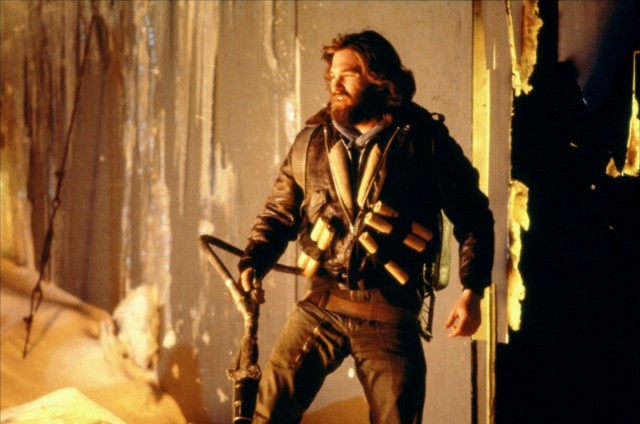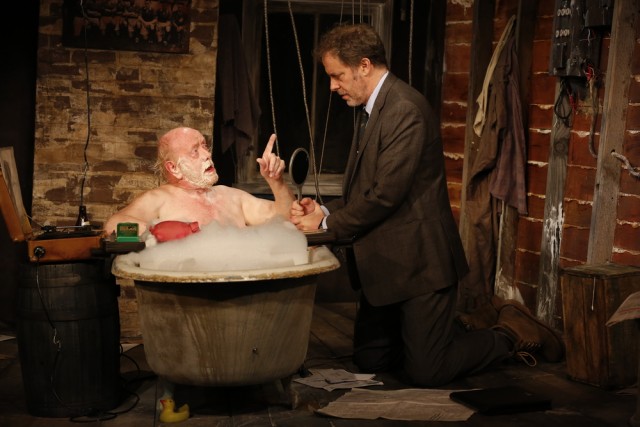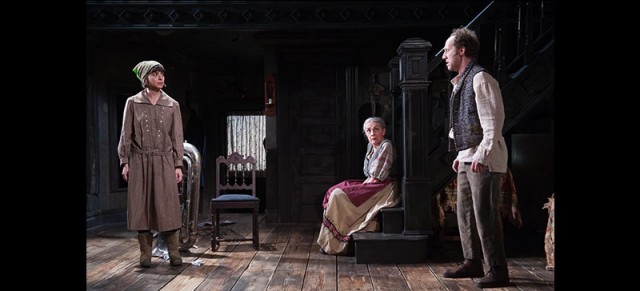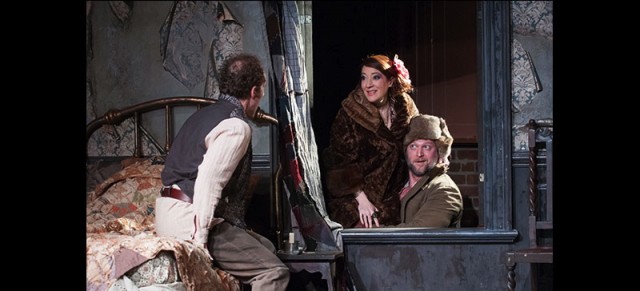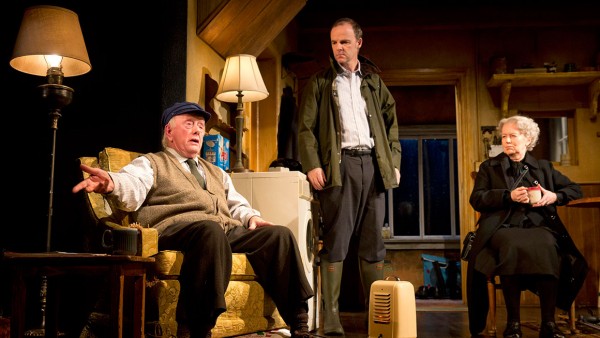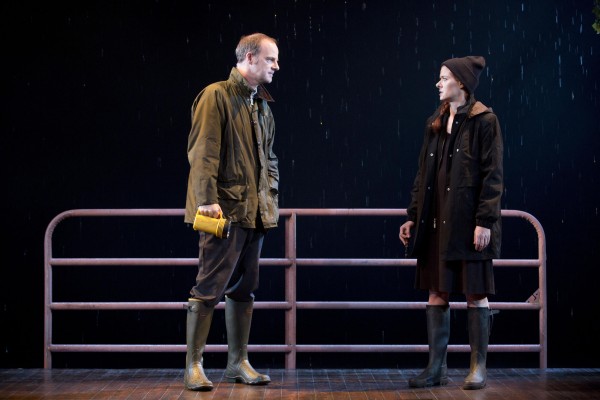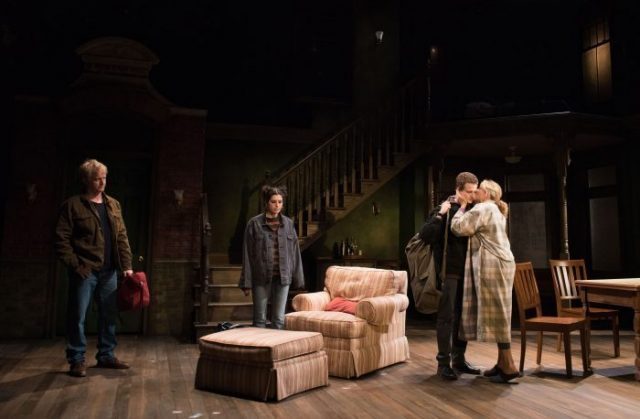
A British family tries to cope following tragedy in Atlantic production of On the Shore of the Wide World (photo by Ahron R. Foster)
Atlantic Theater Company
Linda Gross Theater
336 West 20th St. between Eighth & Ninth Aves.
Tuesday – Sunday through October 8, $65-$85
866-811-4111
www.atlantictheater.org
British playwright Simon Stephens has been making quite an impact on the world of New York theater recently, with the MCC production of Punk Rock, the Atlantic Theater Company’s stagings of Bluebird and Harper Regan, and the Broadway versions of Heisenberg and The Curious Incident of the Dog in the Night-Time, all since 2011. He’s now back at the Atlantic with his 2005 Olivier Award winner, On the Shore of the Wide World, a tightly wound, exquisitely written story of family and fidelity involving three generations of couples in Stephens’s hometown of Stockport, a working-class suburb of Manchester. Ellen (Blair Brown) and Charlie Holmes (Peter Maloney) are the old-timers, living out their golden years, but Ellen suddenly wants more. “We could buy something. Do something unusual. . . . Sell up and go somewhere we’ve never been to before,” she says. “Why?” an incredulous Charlie asks. “Just because we can,” Ellen replies. Their son, Peter (C. J. Wilson), a house restorer, is married to Alice (Mary McCann), who appears ready for a change now that their children, Alex (Ben Rosenfield) and Christopher (Wesley Zurick), are getting older. Alex, who is eighteen, is bringing home his new girlfriend, Sarah (Tedra Millan), whom the younger Christopher, who might be on the autism spectrum, instantly falls in love with. “Is he a little bit mentally ill?” Sarah, who does not have much of a filter, asks Peter, who is taken aback by the question. When tragedy strikes, the characters — which also include Paul Danzinger (Odiseas Georgiadis), Alex’s drug-dealing friend; Susan Reynolds (Amelia Workman), a pregnant woman who hires Peter to restore her house; and John Robinson (LeRoy McClain), a married man who pays an unexpected visit to Alice — reevaluate what they desire out of life as all three main couples face new crises, whether they want to or not. “You have no right to call me a coward. Nobody has any right to call another person a coward,” Charlie tells Alex. “We’re all of us cowards. All of us.”
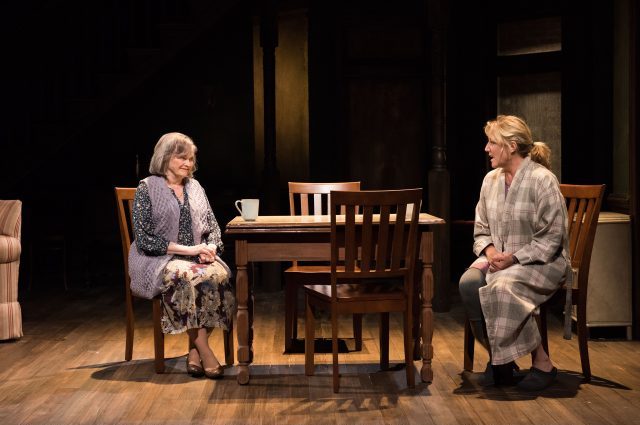
Ellen (Blair Brown) and Alice (Mary McCann) have some harsh words for each other in Simon Stephens’s Olivier Award winner (photo by Ahron R. Foster)
Originally called Helsinki as a tribute to the bleak films of Finnish director Aki Kaurismäki, On the Shore of the Wide World — named for a quote from a Keats sonnet that is cited in the play — is intricately directed by Atlantic Theater artistic director Neil Pepe (Speed-the-Plow, Celebration). Christopher Akerlind’s lighting alerts the audience as to which part of Scott Pask’s all-in-one set, comprising an abandoned hotel, Peter and Alice’s kitchen, and Charlie and Ellen’s living room, the action will be taking place next. The excellent cast of American actors all speak in Mancunian accents that only seldom feel a bit strained. Wilson (Hold on to Me Darling, The Lady from Dubuque), one of our best, most dependable actors, excels as Peter, the house restorer who suddenly loses control of his own home. Rising star Millan (Present Laughter, The Wolves) is quirkily compelling as Sarah, who calls them as she sees them, while McCann (Ghost Stories: The Shawl, Harper Regan), who is Pepe’s wife, brings a soft vulnerability to Alice. Old pros Brown (Copenhagen, Orange Is the New Black) and Maloney (Dying for It, Outside Mullingar) rise above a few awkward moments in the script. And Workman (Tender Napalm, The Death of the Last Black Man in the Whole Entire World) is tantalizingly sexy and flirtatious as the pregnant Susan; it’s no accident that the story occurs over the course of nine months. At its core, On the Shore of the Wide World, is very much about the concept of marriage and monogamy, the idea that two people dedicate themselves to each other as they grow old together. “I think it’s repressive. I think it fucks people up,” Sarah says of wedlock. “I think it stops people doing what they want to do. Shouldn’t let it. Should just live, I think.” In the end, the characters all do exactly that, on the shores of the wide world, looking out from within the house of marriage and family.
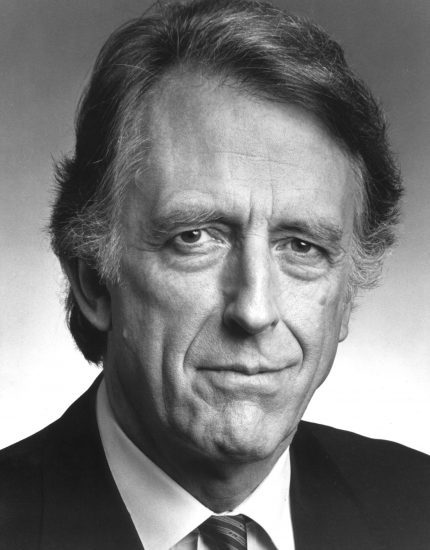
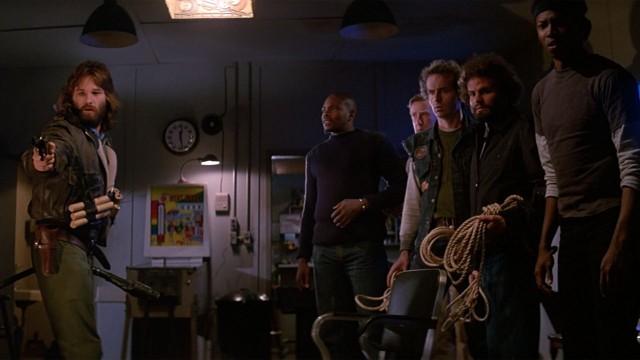
 “What were they doing flying that low, shooting at a dog, at us?” meteorologist Bennings (Peter Maloney) asks Dr. Copper (Richard Dysart) after watching a Norwegian helicopter pilot pursue a dog in the Antarctic, at the beginning of John Carpenter’s The Thing. “Stir crazy. Cabin fever. Who knows?” the doc answers, more than justifying Nitehawk Cinema’s inclusion of the cult film in its February Midnite series Cabin Fever. Carpenter’s 1982 remake of Christian Nyby’s 1951 Cold War sci-fi classic, The Thing from Another World, adds touches of Invasion of the Body Snatchers and Alien, with Kurt Russell leading an all-star cast of familiar character actors set up like a Vietnam War platoon. Russell is the cowboy-hat-wearing R. J. MacReady, part of a group of men at U.S. National Science Institute Station 4 in the frozen Antarctic. The crew also includes soft-spoken biologist Dr. Blair (Wilford Brimley), pot-smoking hippie assistant mechanic Palmer (David Clennon), nice guy geophysicist Vance Norris (Charles Hallahan), dedicated dog handler Clark (Richard Masur), funkster cook Nauls (T. K. Carter), assistant biologist Fuchs (Joel Polis), excitable communications officer Windows (Thomas G. Waites), serious station commander M. T. Garry (Donald Moffat), and skeptical chief mechanic Childs (Keith David). Soon some kind of monster from outer space is on the loose, able to disguise itself as other living creatures, making everyone suspicious of one another, the paranoia growing along with the terror and violence.
“What were they doing flying that low, shooting at a dog, at us?” meteorologist Bennings (Peter Maloney) asks Dr. Copper (Richard Dysart) after watching a Norwegian helicopter pilot pursue a dog in the Antarctic, at the beginning of John Carpenter’s The Thing. “Stir crazy. Cabin fever. Who knows?” the doc answers, more than justifying Nitehawk Cinema’s inclusion of the cult film in its February Midnite series Cabin Fever. Carpenter’s 1982 remake of Christian Nyby’s 1951 Cold War sci-fi classic, The Thing from Another World, adds touches of Invasion of the Body Snatchers and Alien, with Kurt Russell leading an all-star cast of familiar character actors set up like a Vietnam War platoon. Russell is the cowboy-hat-wearing R. J. MacReady, part of a group of men at U.S. National Science Institute Station 4 in the frozen Antarctic. The crew also includes soft-spoken biologist Dr. Blair (Wilford Brimley), pot-smoking hippie assistant mechanic Palmer (David Clennon), nice guy geophysicist Vance Norris (Charles Hallahan), dedicated dog handler Clark (Richard Masur), funkster cook Nauls (T. K. Carter), assistant biologist Fuchs (Joel Polis), excitable communications officer Windows (Thomas G. Waites), serious station commander M. T. Garry (Donald Moffat), and skeptical chief mechanic Childs (Keith David). Soon some kind of monster from outer space is on the loose, able to disguise itself as other living creatures, making everyone suspicious of one another, the paranoia growing along with the terror and violence.